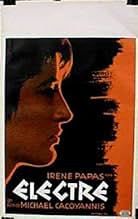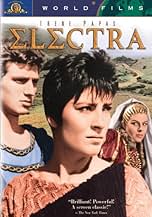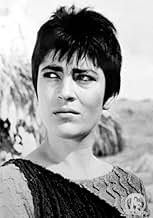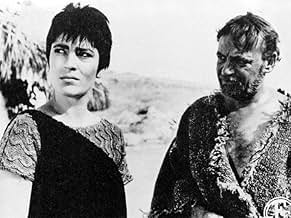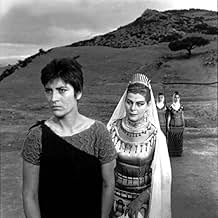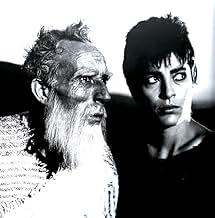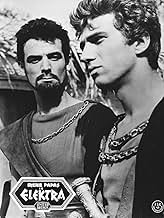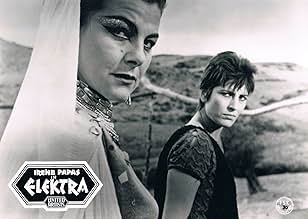AVALIAÇÃO DA IMDb
7,6/10
2 mil
SUA AVALIAÇÃO
Vivendo no exílio após a morte do seu pai, os filhos adultos de um rei assassinado e usurpado convergem para uma vingança.Vivendo no exílio após a morte do seu pai, os filhos adultos de um rei assassinado e usurpado convergem para uma vingança.Vivendo no exílio após a morte do seu pai, os filhos adultos de um rei assassinado e usurpado convergem para uma vingança.
- Direção
- Roteiristas
- Artistas
- Indicado a 1 Oscar
- 11 vitórias e 2 indicações no total
Fivos Razi
- Aegisthus
- (as Phoebus Rhazis)
- Direção
- Roteiristas
- Elenco e equipe completos
- Produção, bilheteria e muito mais no IMDbPro
Avaliações em destaque
Euripides pared to the essentials. Not one word, not one gesture is wasted. Nor is there ever an iota more than necessary.
A stark, spare study of despair in a sun blasted landscape that seems to watch over the pathetic efforts of humans with equal measures of timeless indifference and utter contempt. The characters in the story, the actors on the screen, and we in audience know what will happen next; but we are all powerless to prevent it. It is so intense that it makes Shakespeare's 'King Lear' seem almost frivolous.
It takes five minutes for the first two words to be spoken. 'Strike him!' Everything flows from that line. Another ten minutes of near silence passes before Electra appears. Her back to the camera, she turns to look over her shoulder - electricity is discharged. The audience gasps. Nothing is said but the implacable will is communicated. Nothing good is going to happen next.
It is almost a silent movie. They certainly have faces, to quote Gloria Graham from 'Sunset Boulevard.' By looks, by camera angles, by gestures, by the tensing of shoulders, the widening of eyes, make-up, fine photography, tight cutting, and very few words the tragedy unfolds.
It is always about Electra, to be sure, and Irene Pappas is a force of nature on the screen. She says little but each move, gesture, look, and word is supercharged.
Recommended for adults.
A stark, spare study of despair in a sun blasted landscape that seems to watch over the pathetic efforts of humans with equal measures of timeless indifference and utter contempt. The characters in the story, the actors on the screen, and we in audience know what will happen next; but we are all powerless to prevent it. It is so intense that it makes Shakespeare's 'King Lear' seem almost frivolous.
It takes five minutes for the first two words to be spoken. 'Strike him!' Everything flows from that line. Another ten minutes of near silence passes before Electra appears. Her back to the camera, she turns to look over her shoulder - electricity is discharged. The audience gasps. Nothing is said but the implacable will is communicated. Nothing good is going to happen next.
It is almost a silent movie. They certainly have faces, to quote Gloria Graham from 'Sunset Boulevard.' By looks, by camera angles, by gestures, by the tensing of shoulders, the widening of eyes, make-up, fine photography, tight cutting, and very few words the tragedy unfolds.
It is always about Electra, to be sure, and Irene Pappas is a force of nature on the screen. She says little but each move, gesture, look, and word is supercharged.
Recommended for adults.
each time when I see it, I discover "Electra" as revelation. for the great cinematography, for beautiful performances, for the admirable translation of the play of Euripides in precise portrait of feelings, guilty, desire, the huge sin. all is the part from a lost world. the traces of words, the clash between white and black, the group of women, the landscapes, the knowledge of viewer who is only a piece of clay for Cacoyannis. Irene Papas as the only Electra , like in manner in which, in "Iphigenia", she is the unique Clitemnestra. Giannis Feris as the Orestes who preserves in his presence entire spirit of old Greek statuary art. and, for a long time in the case of me, the axis of film, Aleka Katselli, remembering the memories about Micene and the Troyan war from the history lessons.a film who remains a revelation. about the deep essence of humankind.
An extraordinary film from a visual and dramatic standpoint, _Elektra_ unfortunately too often plays like a _Cliff's Notes_ version of Euripedes' work (although, in all fairness, I must note that the film is only "based on" the classical play). The essential structure is there: Agamemnon's murder, the banishment of Orestes, Elektra's marriage, the reuniting of the grown children, the double murder. But by clipping away much of the Euripedean dialogue, much depth of characterization is lost. The principles become one-dimensional, with only hints of the complexity which makes the story so overwhelming. However, the stark cinematography and fine acting make this film eminently watchable, particularly at the climatic matricide sequence.
I have just seen this film again via DVD after first seeing it in a cinema 40 years ago, and it remains in my view a staggering masterpiece of world cinema. It is a film that should be compulsory viewing by all aspiring film-makers since it is, unlike so many of today's movies which really are over influenced by television, so cinematic it makes one positively nostalgic for concepts like film grammar and form. Cunningly, it is almost a silent movie with a wonderful soundtrack, and the acting, (outstanding by all concerned), shows the great value of body language, and how good film editing, the use of a superb musical score, and excellent black and white cinematography can convey such powerful and poignant emotions. The play on which it is based has of course the soundest of psychological under-pinnings; guilt is an emotion and state of mind that can ONLY be experienced once one has done something horrendous enough to make it possess you. It cannot be imagined or anticipated, and, even when "rational" thought seems to justify the act, as Elektra and Orestes find to their cost, this evaporates instantly once that rage has been quenched. The final sequence of this film, after the mother has been murdered, and when these realisations manifest themselves is so overwhelming and powerful that only the hardest of heart could not be profoundly moved. But, like all good psycho-therapy, it is ultimately sanctifying, even if at the same time it is heart-breaking and almost unbearably poignant. Certainly one of the best films I have ever seen in my life, and every department deserves the highest praise and congratulations. One of the very few films to which I have awarded a 10/10 vote.
As an adaptation of a two thousand year old Greek tragedy, Michael Cacoyannis' "Electra" is hard to beat, and I cannot imagine it being improved upon by any further attempt on it now: there is a stripped down starkness and simplicity to it that benefits it greatly, and lends it the haunting quality of myth that no amount of CGI could better.
It has immaculately brooding, glowing cinematography, unsurpassably shot amid the ancient stones of Mycenae itself, and the music by Mikis Theodorakis (of Zorba The Greek fame) is timeless and perfect.
If I had to point out any weaknesses at all, perhaps Irene Papas in the title role looks a little too 60s in her look, although her acting is fine. There's a couple of gaps in the narrative that should probably have been filmed and inserted, as their absence either weakens the drama or feels confusing. But these are small quibbles.
Several times while watching I found myself thinking it would make a good double bill with Orson Welles' Othello, as it feels cut from a similar cloth, though it is a better film for being less wordy. Recommended.
It has immaculately brooding, glowing cinematography, unsurpassably shot amid the ancient stones of Mycenae itself, and the music by Mikis Theodorakis (of Zorba The Greek fame) is timeless and perfect.
If I had to point out any weaknesses at all, perhaps Irene Papas in the title role looks a little too 60s in her look, although her acting is fine. There's a couple of gaps in the narrative that should probably have been filmed and inserted, as their absence either weakens the drama or feels confusing. But these are small quibbles.
Several times while watching I found myself thinking it would make a good double bill with Orson Welles' Othello, as it feels cut from a similar cloth, though it is a better film for being less wordy. Recommended.
Você sabia?
- CuriosidadesFilmed on location in Mycenae and Argos in 1961.
- Erros de gravaçãoHaving seconds thought about killing Klytaemnistra, Orestis proclaims a devil, not a god, must have spoken to the oracle who told him to seek vengeance. As it happens, the word "devil" comes from the Greek word diábolos which means slanderer or accuser, not the Christian or Islamic word for a supernatural enemy of humankind tempting people to commit evil deeds.
- Citações
Chorus Leader: My child, you must talk to the gods. They will hear you.
Elektra: No god hears me. No human being is listening to my prayers.
- ConexõesFeatured in Storgi sto lao (2013)
Principais escolhas
Faça login para avaliar e ver a lista de recomendações personalizadas
- How long is Electra?Fornecido pela Alexa
Detalhes
- Tempo de duração
- 1 h 50 min(110 min)
- Cor
- Mixagem de som
Contribua para esta página
Sugerir uma alteração ou adicionar conteúdo ausente

